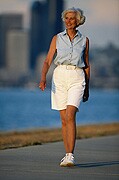- Double Mastectomy May Offer No Survival Benefit to Women With Breast Cancer
- Toxic Lead Found in Cinnamon Product, FDA Says
- Certain Abbott Blood Sugar Monitors May Give Incorrect Readings
- Athletes Can Expect High Ozone, Pollen Counts for Paris Olympics
- Fake Oxycontin Pills Widespread and Potentially Deadly: Report
- Shingles Vaccine Could Lower Dementia Risk
- Your Odds for Accidental Gun Death Rise Greatly in Certain States
- Kids From Poorer Families Less Likely to Survive Cancer
- Tough Workouts Won’t Trigger Cardiac Arrest in Folks With Long QT Syndrome
- At-Home Colon Cancer Test Can Save Lives
Light Exercise Might Reduce Risk of Kidney Stones


Just a little exercise each week — jogging for an hour or walking for about three hours — can reduce the risk of developing kidney stones by up to 31 percent, according to a new study.
Researchers looking at data on more than 84,000 postmenopausal women found that engaging in any type of light physical activity can help prevent the formation of these pebbles in the kidneys. Even light gardening might curb their development, according to the study, which was published recently in the Journal of the American Society of Nephrology.
“Even small amounts of exercise may decrease the risk of kidney stones,” said study author Dr. Mathew Sorensen, of the University of Washington School of Medicine. “It does not need to be marathons, as the intensity of the exercise does not seem to matter.”
Kidney stones, which have become increasingly common, are more prevalent among women. During the past 15 years, research has shown that kidney stones might actually be a systemic problem, involving more than just the kidneys. Recent research has linked the stones to obesity, diabetes, metabolic syndrome and heart disease.
In conducting the study, the researchers analyzed information compiled since the 1990s on the women’s eating habits and level of physical activity.
After taking into account the women’s body-mass index (a measurement of body fat based on a ratio of height and weight), the researchers found that obesity was a risk factor for the development of kidney stones. Eating more than 2,200 calories a day could increase the risk for kidney stones by up to 42 percent, they found.
“Being aware of calorie intake, watching their weight and making efforts to exercise are important factors for improving the health of our patients overall, and as it relates to kidney stones,” Sorensen said.
Dr. John Lieske, of the Mayo Clinic in Rochester, Minn., said the study, which included only postmenopausal women, must be replicated in a larger, more diverse population. Women who engage in regular physical activity also likely have other healthy habits that help lower their risk for kidney stones, he added.
“Nevertheless, conservative counseling for patients with stones often centers almost exclusively on diet, stressing increased fluid intake, normal dietary calcium, lower sodium, moderate protein and reduced dietary oxalate,” Lieske wrote in a journal editorial accompanying the study.
The results of this study suggest that a recommendation for moderate physical activity might reasonably be added to the mix, he said. The study did not, however, prove a cause-and-effect link between exercise and decreased risk for kidney stones. It showed only an association between the two in a small portion of the population.
Each year in the United States, more than 300,000 people go to emergency rooms for kidney stone problems. Larger stones can get stuck in the urinary tract and block the flow of urine, causing severe pain or bleeding.
More information
The National Kidney and Urologic Diseases Information Clearinghouse provides more information on kidney stones.
Source: HealthDay
Copyright © 2024 HealthDay. All rights reserved.










